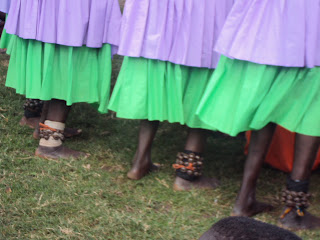SO, It finally happened … I thought it never would … because I’m just not that person … I’m not that person who gets
homesick.
However about 2 ½ - 3 weeks ago I realized that I was. I know it may be strange that I remember the time my homesickness came, but to be honest I’m surprised that it came at all.
You see, I really seldom get homesick. My immediate family is not extremely close, but we are not distant- we love each other, but we don’t hover- we worry about each other, but we may not express it every time we feel it-
As for my extend family: my Aunts, Uncles, Cousins, Grandparents and best friends- They are all proud of me. Their well wishes and blessings have kept me so, that I’ve never been able to become too homesick.
Even in my 1 ½ years of staying on campus at UT, I was never the student who just couldn’t wait for break. It just didn’t hold the same appeal. I may have been excited about
getting a break from school work, but never about just going home.
Actually during my first semester at UT, I stayed on campus for Fall Break. While everyone pilled into cars and headed home for the 3-day break, I refused to go. I had school work to do and it was just
3 days. I didn’t understand the hype. I knew traveling back to Memphis would distract me from work so a friend and I decided to tough it out and stay on campus … It was like a ghost town. I didn’t quite understand why people just
had to leave.
However, I think I’m starting to get it now.
While I’m able to hold out much longer, others are not as “tolerant” of being away from home. But I think I may have found my limit- and it has nothing to do with the length of time- nothing to do with being in a foreign country …
But it’s the feeling of not being able to travel back home when you have the urge to see family and friends. To be able to travel back to a much familiar space and time- to be in the environment that you grew up in
If I were living in Uganda and could fly back home at any moment’s notice then I don’t think I would have gotten to this point- to feeling like this. But since I was suppose to leave in May and pushed my date of departure back to July I had gotten used to anticipating that I was leaving
in May. Well, May has come and gone and my subconscious took notice.
I remember saying to myself one day, “Man, I just want to go home!” but I felt guilty right after thinking those words. All the wonderful experiences I’ve had here, all the growth- the knowledge I’ve gained. All the people who’ve touched me, their stories and hopes- the places I’ve seen … the things that put me in awe of this beautiful country … I hated that I had ever thought such words. To just
want to go home-
I shared these same feelings with a very astute woman and she told me straightforwardly that it happens to all of us-
That simple- It happens to us
all- even me.
The words of my mentor, Dr. Rosalind Hackett reminded me that it wasn’t me wanting to leave Uganda, but me wanting to just be home … at least for a little while!
Right now, the feeling of being
homesick retreats and comes back like a tide. It hits me in waves. Whether it stems out of an email from my mom that makes me want to just run across the ocean to see her or a silly/sincere message from a best friend on facebook or a small reminder in my day that makes me have a flashback of home- but when the feeling comes my heartaches and a wave crashes upon my shore.
Absence
does make the heart grow fonder- apparently in my case.
I am truly thankful to God for the truth of this statement though. Through this journey and separation, my mother and I have become closer. She still tries to overprotect me and she worries entirely too much, but the “I love yous” and “I miss yous” are exchanged on a regular between us. There’s a hint of new openness between us too. It’s nice and I hope it lasts. To be honest my journey to Uganda has brought my entire family a bit closer. OH the unexpected consequences, well let’s call them gifts, of researching and living in Uganda! I would have never thought!
…
They say:
“Home is where the heart is” – As my mentor reminded me
“Home is wherever your key can actually open the door” – a friend once claimed
“Wherever he laid his hat was his home” - The Temptations
All of these statements hold some truth to them so I’m challenging this notion of what home is. Is it where your family is? Is it where your friends are? Your work? Your job? Your school? Where your possessions are? … now, that’s something to think about.
Where is home for you? Are you really just limited to one place? … Oh, I sure hope not!
For me, my arms are open to the world- especially to all the places I’ve yet to go! Where my travels lead me- where a piece of my heart stays
will be home. And when I’m away from one of my homes for too long I won’t shy away, but expect my
homesickness to remind me that I don’t want to leave where I’m at because I’m tired of being there, but that a piece of me somewhere else would like a chance to be reclaimed … at least for a little while :)














































